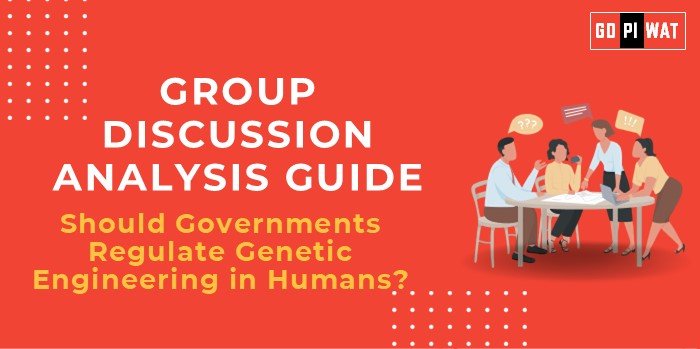📋 Group Discussion (GD) Analysis Guide: Should Governments Regulate Genetic Engineering in Humans?
🌟 Introduction to the Topic
Opening Context:
Genetic engineering in humans raises profound ethical, social, and scientific questions. From curing genetic disorders to potential misuse in creating “designer babies,” this field is a cornerstone of modern bioethics and governance discussions.
Topic Background:
Genetic engineering technologies, such as CRISPR, have rapidly advanced, enabling precise editing of human DNA. While the potential to eradicate diseases is transformative, the ethical dilemmas surrounding human enhancement, eugenics, and equity call for scrutiny. Countries like the US and China are at the forefront of this debate, showcasing diverse regulatory approaches.
📊 Quick Facts and Key Statistics
- 🧬 CRISPR Advancements: Over 6,000 genetic disorders are potentially treatable with gene-editing technologies.
- 💰 Global Spending: $10.7 billion invested in genome editing research (2023), indicating rapid sector growth.
- ⚖️ Regulatory Landscape: 40+ countries have bans or restrictions on human germline editing.
- 📊 Public Opinion: 72% of Americans favor genetic engineering for curing diseases but oppose enhancements for physical or cognitive traits (Pew Research, 2023).
🤝 Stakeholders and Their Roles
- ⚖️ Governments: Regulate research and application, ensure ethical compliance, and promote equitable access.
- 🔬 Scientific Community: Develop technology, publish findings, and set ethical standards.
- 🏥 Healthcare Sector: Implement genetic treatments and ensure patient safety.
- 🌍 Public and Advocacy Groups: Influence policy and ethical standards, raising awareness of risks and benefits.
- 📜 International Organizations: Create global ethical frameworks (e.g., WHO, UNESCO).
🎯 Achievements and Challenges
Achievements:
- ✔️ Medical Breakthroughs: Gene therapies for conditions like sickle cell anemia and muscular dystrophy are showing success.
- ✔️ Disease Eradication: Potential elimination of hereditary diseases, improving global health outcomes.
- ✔️ Economic Growth: Thriving biotech sectors contribute significantly to GDPs in developed nations.
Challenges:
- ⚠️ Ethical Concerns: Dilemmas over human enhancement and genetic equity.
- ⚠️ Risk of Misuse: Unauthorized or unethical applications, e.g., gene-edited embryos.
- ⚠️ Accessibility Issues: High costs limit benefits to affluent populations.
🌍 Global Comparisons
- 🇨🇳 China: Ambitious CRISPR research but criticized for ethical violations (e.g., gene-edited babies).
- 🇬🇧 UK: Robust regulation with Human Fertilisation and Embryology Authority oversight.
Case Study:
He Jiankui Controversy (China): Highlighted gaps in global ethical governance for gene editing.
🗣️ Structured Arguments for Discussion
- ✔️ Supporting Stance: “Governments must regulate genetic engineering to prevent misuse and ensure equity.”
- ❌ Opposing Stance: “Overregulation stifles innovation, delaying life-saving treatments.”
- ⚖️ Balanced Perspective: “A global framework for regulation balances ethical concerns with scientific advancement.”
📋 Effective Discussion Approaches
- 📜 Historical Context: “Genetic engineering has progressed from theoretical concepts to curing hereditary diseases. But can we control its power ethically?”
- 🧬 Ethical Inquiry: “Is editing human DNA to enhance traits an evolution of humanity or a dangerous path?”
- 📊 Data-Driven: “With $10.7 billion invested in genome editing, regulation will determine the balance between progress and ethics.”
Counter-Argument Handling:
“While concerns about stifling innovation are valid, structured regulations prevent ethical violations that could hinder public trust.”
🔍 Strategic Analysis of Strengths and Weaknesses
- ✔️ Strengths: Potential to eradicate genetic diseases, significant economic opportunities, enhanced scientific understanding.
- ❌ Weaknesses: Ethical dilemmas, high costs, and accessibility issues.
- 💡 Opportunities: Collaboration for global standards, integration with personalized medicine.
- ⚠️ Threats: Misuse for eugenics, public backlash due to ethical violations.
💼 Connecting with B-School Applications
- ✔️ Real-World Applications: Ethical frameworks for biotech firms, exploring public-private partnerships for equitable access.
- ✔️ Sample Interview Questions:
- “How should governments balance innovation with ethical concerns in biotech?”
- “What role can businesses play in ensuring ethical applications of genetic engineering?”
- 📚 Insights for B-School Students:
- Opportunities in bioethics consultancy, strategy roles in biotech, and research on global health equity.


